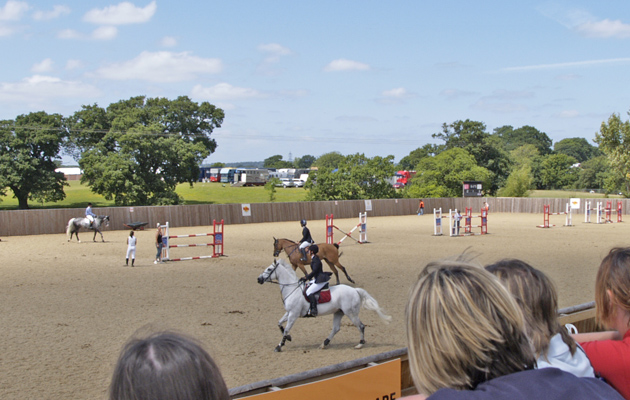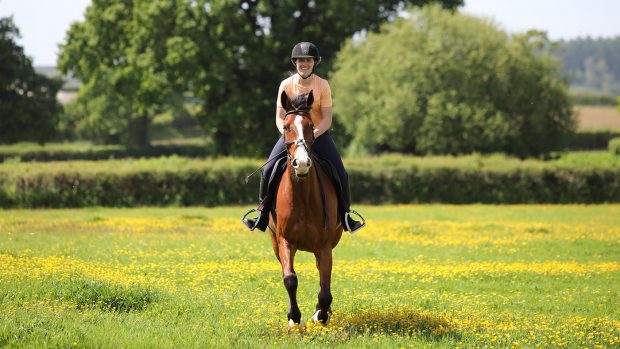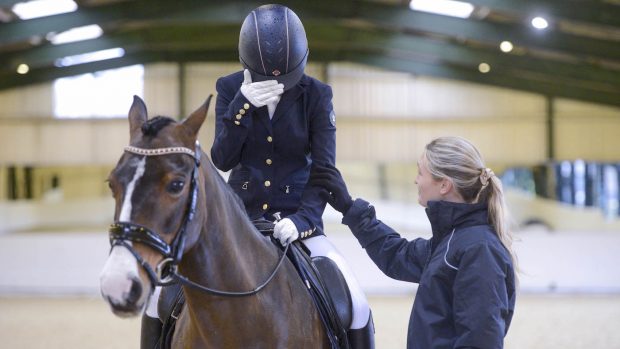Positive psychology is a revolutionary new form of psychology which looks at the science of positive emotions. This new frontier for human performance centres around understanding how emotions affect thinking and actions and was one of the topics featured at a The Pony Club Coaching Conference. There, Professor Tony Ghaye (together with Marie Ryan) discussed the ways in which positive psychology can impact riders and improve their standard of performance.
1. First do it, then do it right, then do it better
“One of the best ways to get better at something is to have the emotional courage to have a go and then reflect on what you did, learn from this and put this learning to good future use. This is often known as experiential learning,” explains Professor Ghaye, who works with riders and coaches in all equestrian disciplines who are seeking to improve what they do. “The art of reflection on action is a key component in helping you to improve.”
Professor Ghaye warns that there is no value in reflecting only on your mistakes and failures, stressing that you should also reflect on what went well, why and how you can keep doing well.
2. Letting things go
Professor Ghaye emphasised that you shouldn’t be fixated on fixing weaknesses, or on things that are going less well. Often you need to let things go, or to unlearn something, particularly if it’s something negative, so you can create space in your head to learn something new.
“Holding on to negative feelings and thoughts don’t serve you well. If you always think about what went wrong, like the kind of fence you always knock down, then this problem only grows bigger in your mind,” explains Professor Ghaye. “Solve the problems you face or leave the problem alone. Don’t live with the problem.”
He also stresses that we should focus on desires not disappointments. We should focus on what we want more of (enjoyment, success) and not less of (stress, frustration). If we don’t do this, we run the risk of not enjoying our riding.
3. Being in control
“When riding, when do you feel your best and do your best?” asked Professor Ghaye as he introduced delegates to the power of positive emotions and the need to build emotional muscle if you are to ride well.
“The emotional part of your brain governs everything — it affects how you feel which influences what you think, which in turn affects what you do,” he continues. “At times your emotions can be so strong that they cloud your judgement so learning to manage the feelings part of your brain will have a huge impact on your riding performance.”
Professor Ghaye made the point that although most people don’t know what’s possible for themselves, what they do know is that understanding how we feel is a key driver in riding successfully.
4. Use your strengths
Do you know what your strengths are? Become familiar with your performance strengths (what you can do) and character strengths (the kind of person you are) and use them as often as you can.
For example, if you are great at attention to detail (performance strength) and you also self-regulate well (you’re a disciplined person), then make sure you use these strengths when preparing to ride and when competing.
5. It’s good to talk
If you’re always worrying about what people think of you, how well you’re riding in competition and if you’re making enough progress then this will impair your ability to ride to your potential. Bottling up your feelings is unhealthy. Talk to people about how you are feeling and what you are thinking. Make sure you look after your mental health and develop a positive sense of personal well-being.
“To ride well and to flourish in the sport depends on you paying attention to how you feel not just what you can do,” says Professor Ghaye.
Article continues below…
You might also be interested in:

10 things successful riders don’t do and you should avoid too

8 ways to build your confidence ASAP
Camilla Henderson and Zoe Taylor reveal eight ways in which you can build and improve your confidence

Subscribe to Horse & Hound magazine today – and enjoy unlimited website access all year round
6. Believe in yourself
Everyone has self-doubt at times but if you know yourself and know what works for you this can be easier to combat. Professor Ghaye explained that positive psychology directs us towards changing our bad habits into good habits for the purpose of riding well and optimal personal well-being.
“Building your self-belief is a fundamental part of a positive approach to improving your riding,” he explains. “Identify your positive side, do not surround yourself with negative people, seek feedback on your riding, embrace praise and keep things in perspective. We all get down from time to time, and we get a little broken but last time I checked even broken crayons can still colour!”
Would you like to read Horse & Hound’s independent journalism without any adverts? Join Horse & Hound Plus today and you can read all articles on HorseandHound.co.uk completely ad-free





